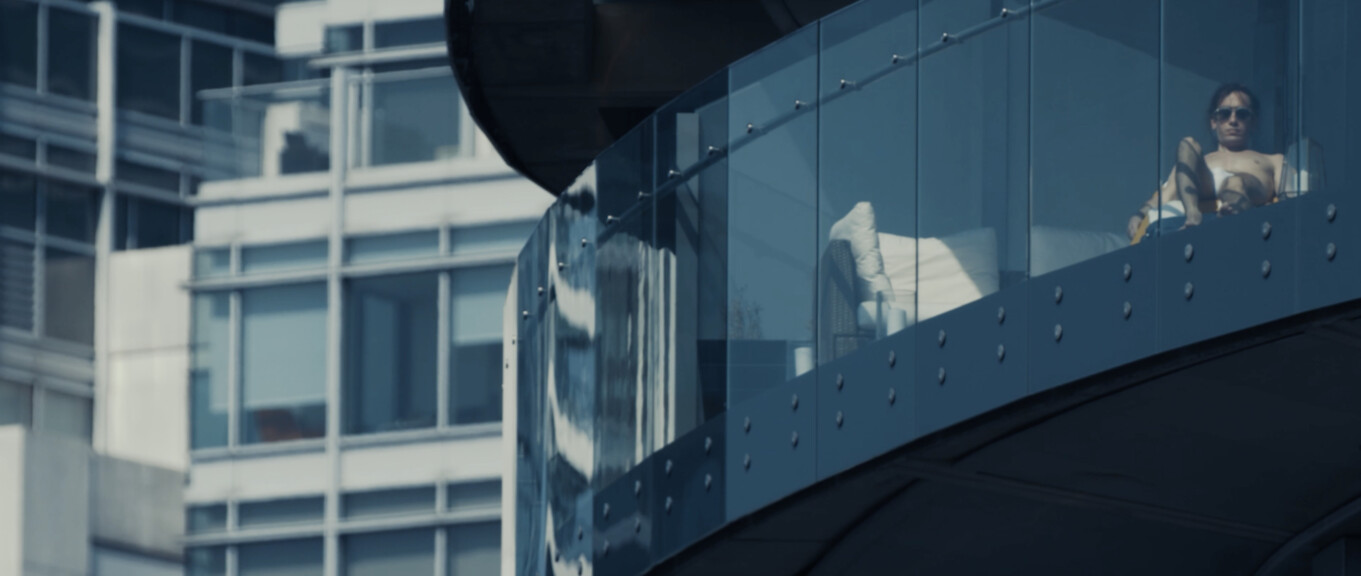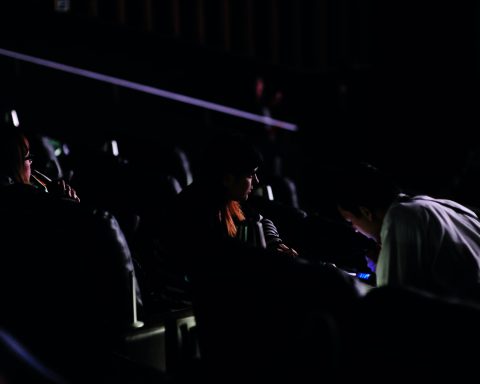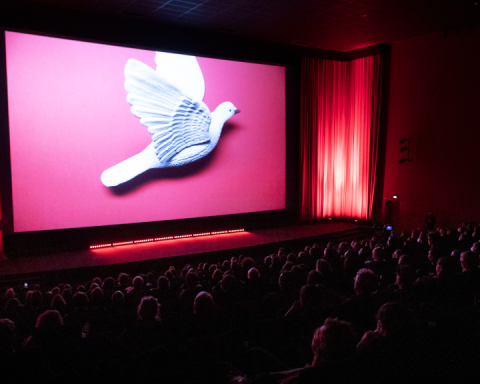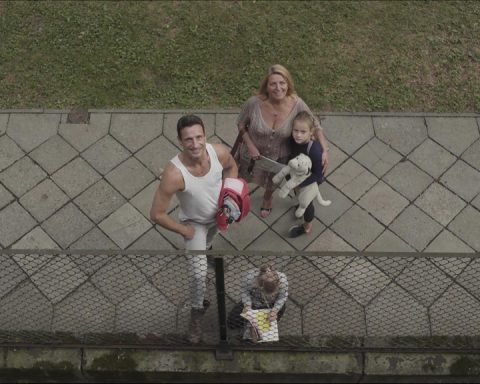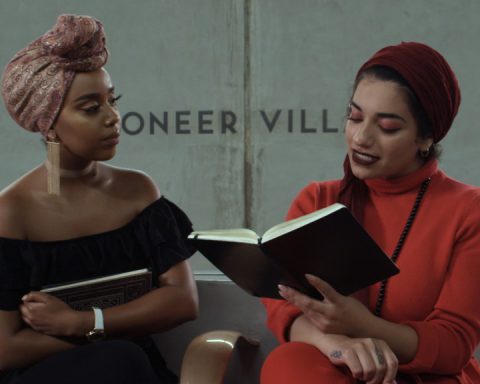Amid the seismic changes Leipzig has undergone over the past six decades, there is at least one constant: DOK Leipzig. The documentary and animated film festival is back for its 63rd edition despite the restrictions under the current pandemic. Its reduced – though still ample – repertoire of 150 films features pressing issues of the zeitgeist as shot from around the world, including isolation, division, misinformation, and the state of democracy. Some even managed to document the onset of Corona already.
COVID-19 rules have forced DOK Leipzig to shift many of its activities to the online realm.
For instance, parties are a no-go and awards are presented virtually. The participating filmmakers won’t be able to travel to Leipzig, so they have recorded videos for the festival’s “Director’s Short Cuts” series. There are 40 of such videos, mini-documentaries in themselves, about the films or whatever else the creators wanted to express.
When life gives you lemons, make a movie.
As things stand now, the audience can watch DOK Leipzig films at local cinemas for the week of the festival or online for two weeks. Those lucky enough to be in Leipzig can experience in person the DOK Neuland VR exhibit, which has evolved into one of the festival’s coolest and most fascinating offers since it began a few editions ago – in itself a reflection of our zeitgeist. The free screenings at Leipzig Hauptbanhof will also happen, though of course with more limited space, partitions and the compulsory contact tracing form.
At the Hauptbahnhof Osthalle it’s first-come, first-served, but for the other cinemas you should peruse the program and reserve tickets in advance, of course. There will be no DOK Leipzig central office this time, so the tickets are to be picked up on location. With a little bit of planning you can make it, though.
We got to binge on some DOK Leipzig short films at home, during isolation from weekend nightlife, and give you a preview here.
The selection is based on personal interest and follows a bit of a thematic thread – namely, the mess we all find ourselves in. But wait, there is hope… perhaps.
Bless You!
Poland 2020; 30 minutes, Russian audio with English subtitles
DOK Leipzig Competition for the Audience Award Short Film
This documentary by Tatiana Chistova takes us to Corona lockdown in St. Petersburg last spring. We lurk with the filmmaker around the yards of mostly dilapidated buildings. We stare at walls, trees and creepy birds. Occasionally a solitary elderly person pops up in a balcony. A lit up window reveals an elderly woman balancing precariously atop a ladder. Precarious, to say the least, are also the conditions society’s most vulnerable found themselves in during the lockdown.
The urban decay we see echoes the abandonment of the elderly amid their isolation in the Russian metropolis.
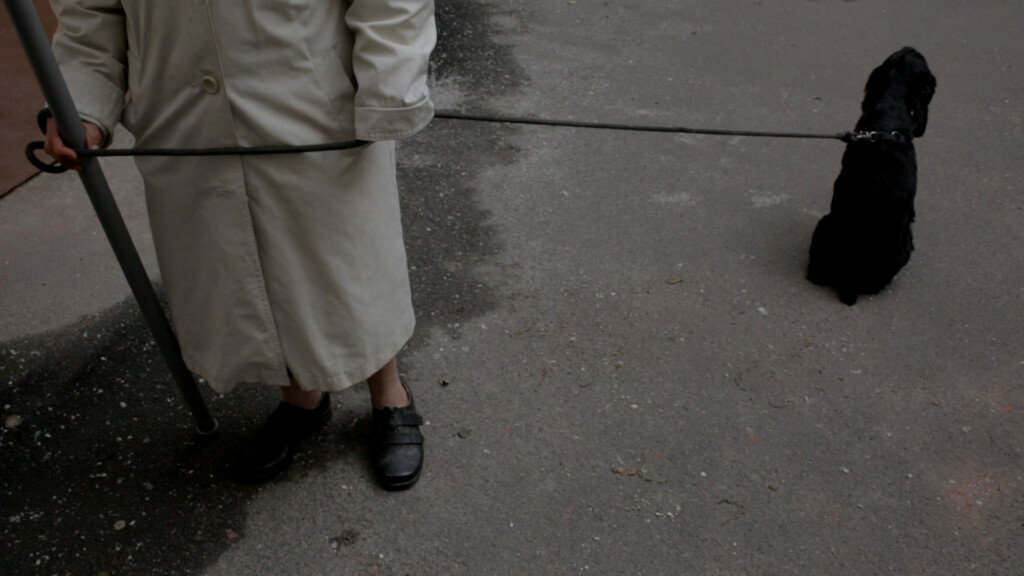
The images parallel what we hear throughout the documentary. We eavesdrop on phone calls to a municipal hotline. They mostly come from elderly people and are often frantic. The forced isolation has cut off their access to essential medications and groceries. They do not believe that the government will give them money or send volunteers to help – or anything the government promises or claims, for that matter. The government sends them sausages and baby food as a “care package.” They are all alone or with worried or sick relatives, and are sometimes resigned to an impending death, at other times panicking. Yes, it does get pretty grim.
The voices on the other end of the line sometimes do react with a little bit of compassion, but mostly they just say there is nothing they can do. They, too, are out of money and out of hope, and know nothing but “general information.”
The helplessness of it all feels oppressive and gives a lot to ponder.
The pandemic has very much brought into stark view the division between the haves and have-nots of this world: It is an entirely different thing to be in isolation with a social net or sizeable private assets. Without one line of commentary, this film manages to drive its point home. It allows the voices of ordinary Russians to speak for themselves. Meanwhile, the Corona situation in Russia reportedly remains dire, though – perhaps unsurprisingly – the government is playing it down.
Where to watch the full film:
In the cinemas
Part of the compilation “Audience Award”
28.10.2020
11:30 – 12:51
Passage Kinos Wintergarten
30.10.2020
20:30 – 21:51
Passage Kinos Astoria
01.11.2020
20:00 – 21:21
Schauburg
Online
29.10.2020 – 12.11.2020
On Demand on CultureBase.org
E14
UK 2020; 19 minutes, English audio with no subtitles
DOK Leipzig International Competition Short Film
Peiman Zekavat traveled near and far to shoot documentaries for outlets such as Al Jazeera and The Discovery Channel. Then the COVID-19 lockdown last spring confined him to his apartment in the E14 area code of Greater London. With his high-grade equipment, limited scope and plenty of free time on his hands, Zekavat decided to aim his camera at his neighbors and their habits while in isolation. The result is a 19-minute video essay both voyeuristic and philosophical, detached and intimate, clinical and poetic.
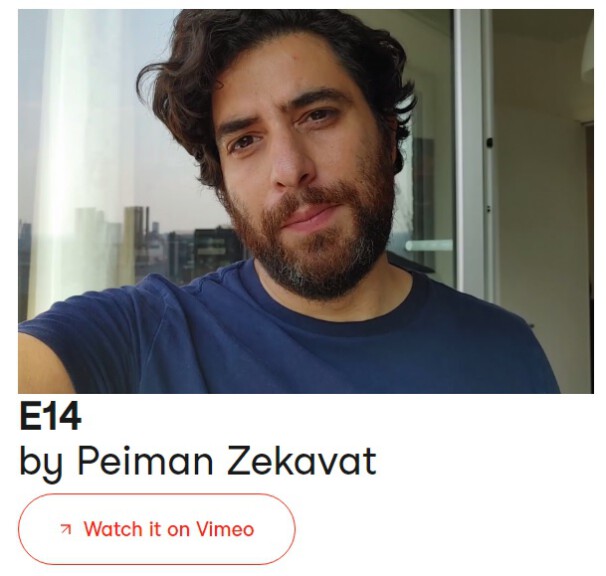
The style and narrator’s voice called to mind the channel Animal Planet, Hitchcock’s Rear Window (which the very well-written script mentions in passing), and the old sci-fi series The Twilight Zone.
There is a nod to the suburban tragedy American Beauty and to doomsday clips from the Cold War era. The enemy here is an invisible scourge that “turns our loved ones into numbers,” but also a soulless capitalism that has already isolated and divided us. Right outside the filmmaker’s window, the narrator notes, is a building that could very well be what our “space settlements” will look like. Mixing footage from his window with sounds from his TV, Zekavat zooms in onto the mundane to zoom out – or further in – onto (co-)existential questions and fears we all grapple with.
Where to watch the full film:
In the cinemas
Part of the compilation “Inside and Outside”
27.10.2020
19:30 – 21:02
Grassimuseum
30.10.2020
12:00 – 13:32
CineStar 2
31.10.2020
17:15 – 18:47
Passage Kinos Wintergarten
Online
28.10.2020 – 11.11.2020
On Demand on CultureBase.org
“Hello,” We Lied
USA 2020; 12 minutes, English audio with no subtitles
DOK Leipzig Competition for the Audience Award Short Film
Here filmmaker Laura Gamse zeros is on the media and gives us a glimpse into the psychology of fake news. She projects news shows onto different surfaces we look at as we go about our day, to symbolize how inescapable the news are. It is implied that the viewers are the victims, while right-wing media outlets are so desperate to confirm their worldview that they will jump on any morsel attractive enough and legitimize it as actual news.
It is also suggested that a guy named Jestin Coler started the current fake news cycle. However, one is likely to have heard about the Macedonian “fake news complex” or about Cambridge Analytica before ever hearing about this US American. From the documentary one may infer he is a Trump supporter, for the damage he ended up causing. Which is to say that it may have been too ambitious to attempt to address a giant topic with so many tentacles in a mere 12 minutes.
Interviewed in the documentary, Coler may strike one as both regretful and prideful regarding his “accomplishment.”
It is difficult to read him, though he seems quite open in talking about events: In the lead-up to the 2016 US presidential elections, Coler built “satirical” websites that looked like regular news sites. Elsewhere he has claimed that his purpose was to produce fake news similar to the ones being spread by the alt-right movement and then point out how ridiculous the stories were in order to discredit and expose the movement. But he had too much fun and continued producing viral stories, and eventually they backfired. Fox News started picking them up, and the rest is history. It would have helped if the documentary had given a bit more of this history for context, though – especially for an international audience.

Where to watch the full film:
In the cinemas
Part of the compilations “It’s Politics, Stupid!” and “Audience Award”
27.10.2020
21:45 – 23:23
Cinémathèque Leipzig
28.10.2020
11:30 – 12:51
Passage Kinos Wintergarten
28.10.2020
20:45 – 22:23
Schaubühne Lindenfels
29.10.2020
12:00 – 13:38
CineStar 2
30.10.2020
20:30 – 21:51
Passage Kinos Astoria
01.11.2020
20:00 – 21:21
Schauburg
Online
28.10.2020 – 11.11.2020
On Demand on CultureBase.org
29.10.2020 – 12.11.2020
On Demand on CultureBase.org
William Jefferson Wilderness
UK, USA 2020; 6 minutes, English audio with English subtitles
DOK Leipzig International Competition Short Film
This little film says so much in its 6 minutes that is especially important to hear before presidential elections. Its topic seems narrow at first sight: the rise and fall of Former US President and Current Resident Pervert William “Bill” Jefferson Clinton. But it is actually quite universal, because we as a society have a tendency to deify our politicians.
This has had dire consequences for our dream of democracy. We tend to put other human beings, elevated by media coverage and possessions, on a pedestal, pin all our hopes on them and expect them to behave as “model citizens.” It turns out that they are as flawed and (self-)destructive as the rest of us are, and are bound to screw it up somehow (or be set up or both) at some point, magnified by a million by power and money and privilege. It seems human beings are not meant to have so much control over so many other human beings’ lives. But many voters have gone on to elect someone they think or are led to believe is the opposite of their fallen hero they now demonize, and the whole process starts again. Recent extremes have landed us with the likes of Trump (US) and Bolsonaro (Brazil).
The filmmaker behind this documentary, Ben Young, implies that he has realized some of that. But his feelings about Bill Clinton are complicated (he gives some extra insights in his creative “Short Cut” for DOK Leipzig).

As a child, he met Clinton in person along his 1992 campaign trail in the South, and the then-Arkansas governor made an indelible impression on the boy and others as a “man of the people,” with a relatable, somewhat troubled, working class background.
Clinton would climb all the way to the presidency that same year, and this made working class people believe they could rise above their circumstances as well. Gradually the illusion crumbled; the filmmaker laments that Clinton became the worst and most predictable stereotype of the rich, white, dirty old man. Also, somehow the end of the Clinton presidency coincided with the advent of the 21st century and its idiocracy, and Clinton became part of the filmmaker’s musings on how the hell we got here.
Through its eloquent first-person narration, the short film takes us from nostalgia to eulogy – seemingly as much for the boy’s lost innocence as for his fallen hero – to meditations on human nature versus nurture, morality and the degradation of Clinton and the human race. What it lacks in compelling footage the film makes up for in poetry.
Where to watch the full film:
In the cinemas
Part of the compilation “It’s Politics, Stupid!”
27.10.2020
21:45 – 23:23
Cinémathèque Leipzig
28.10.2020
20:45 – 22:23
Schaubühne Lindenfels
29.10.2020
12:00 – 13:38
CineStar 2
Online
28.10.2020 – 11.11.2020
On Demand on CultureBase.org
Ain’t No Time for Women
Canada 2020; 19 minutes, Arabic, French audio, English subtitles
DOK Leipzig International Competition Short Film
Ever wish you were a fly on the wall of someone else’s hairdresser? Here filmmaker Sarra El Abed takes us to one in Tunisia, where the women are talking politics as the presidential elections approach. You might recall that the country is where the Arab Spring started at the end of 2010. It is lauded as the movement’s only success story in terms of a fledgling democracy.
The documentary opens in French, with a voice on TV lauding just that. The interlocutor marvels at the upcoming Tunisian elections taking place “without the name of the winner being known in advance,” something he cannot recall happening in Arab countries.
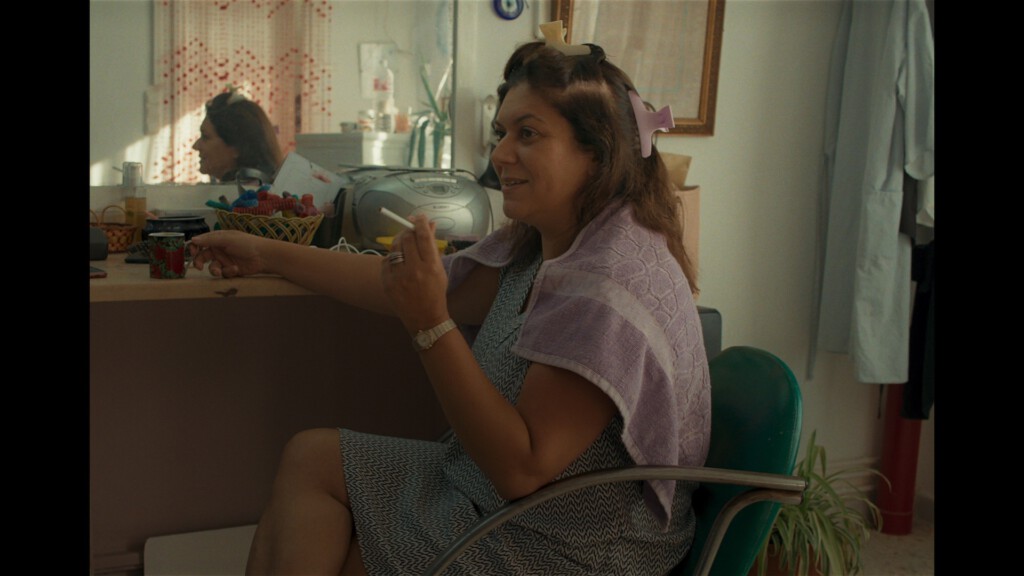
Through a little bit of explanatory text and the customers of all ages in the hairdresser, we learn bits and pieces about this new democracy. The threat or appeal of a conservative party is rallying the women back into action. There are reportedly 26 candidates running for president. They relish their hard-earned ability to speak out now that the dictatorship is gone.
There may be some surprises here regarding age stereotypes of conservatism versus progressiveness.
In some aspects, they might have been talking about the same things – from hair to what they like or dislike in candidates – in a hairdresser in US, Brazil or Germany. The difference is that these Tunisian women are still able to keep it largely civil, respectful and even jestful through their differences and arguments. At least to each other’s face (when the offender walks away then it is open season). This is undoubtedly only a curated microcosm of Tunisian public life and people’s stances, but one gets the sense that they can discuss openly now.
They put makeup on to go vote, ask each other if they are proud of their choice, congratulate each other for having done it. They fret and celebrate as if it were the World Cup.
Out of the documentaries previewed here, this one is definitely the most hopeful and optimistic. Good thing these films are presented in compilations at DOK Leipzig to balance each other out. The “blocks of shorts” shown together at film festivals tend to feature excellent variety and not draw as much of a crowd as the hyped up feature-length productions. Short film marathons are also perfect for restless viewers with many interests and a very hungry mind. So definitely give them a shot!
Where to watch the full film:
In the cinemas
Part of the compilation “It’s Politics, Stupid!”
27.10.2020
21:45 – 23:23
Cinémathèque Leipzig
28.10.2020
20:45 – 22:23
Schaubühne Lindenfels
29.10.2020
12:00 – 13:38
CineStar 2
Online
28.10.2020 – 11.11.2020
On Demand on CultureBase.org

